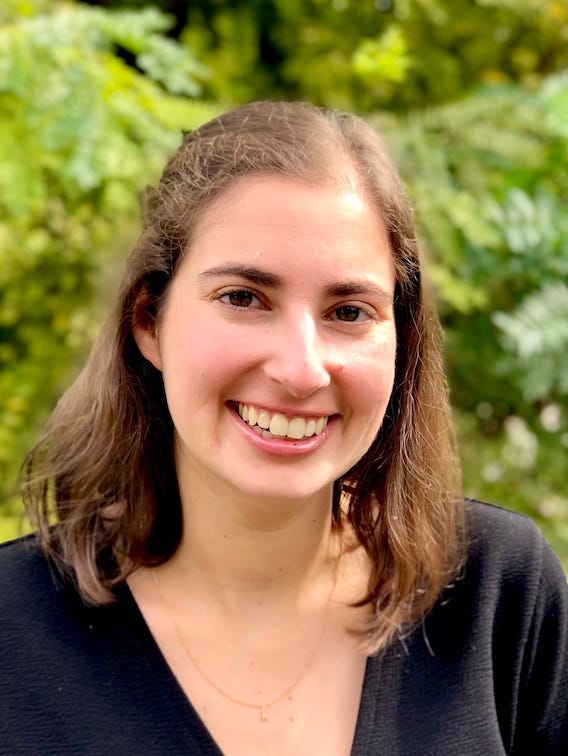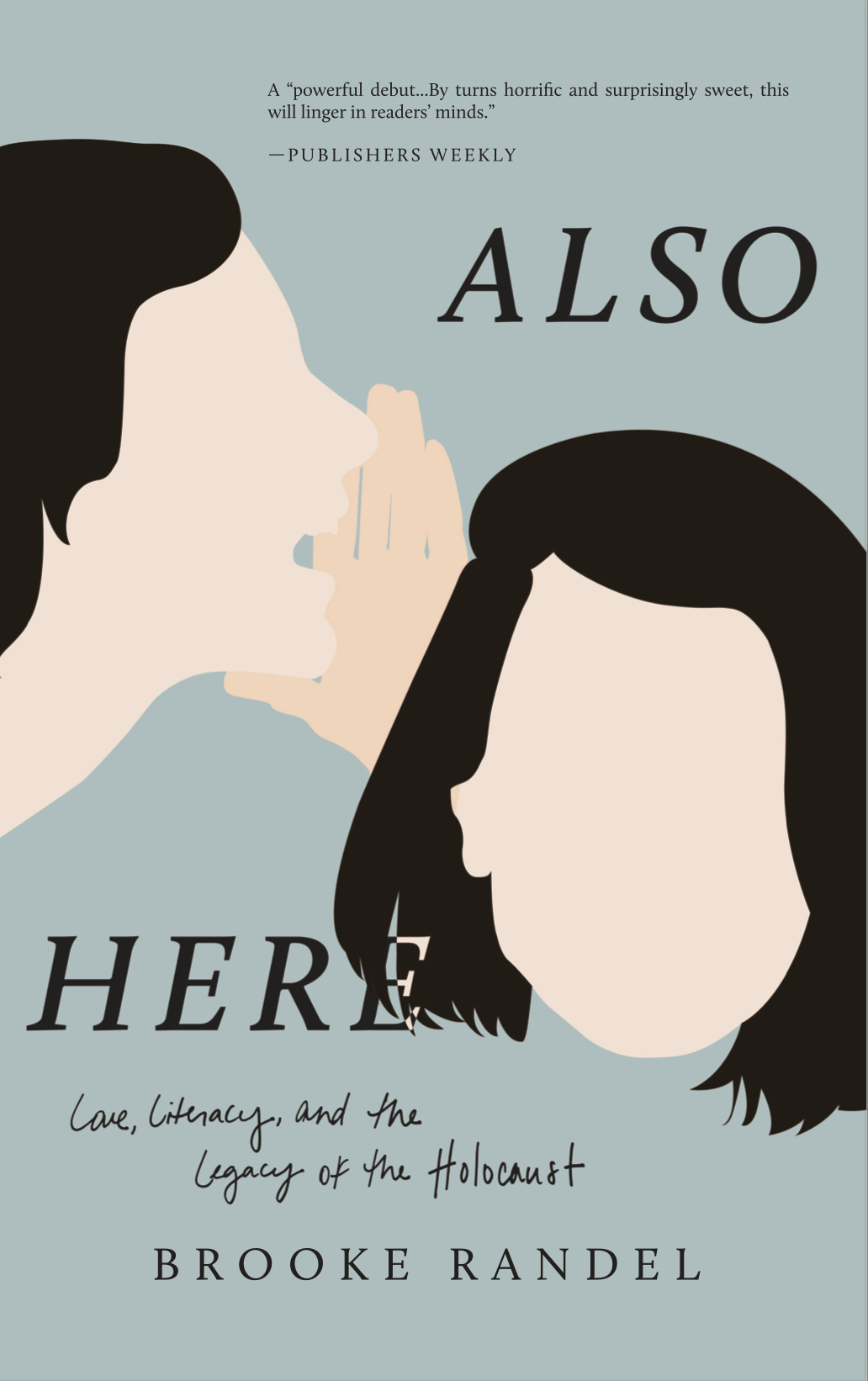The Memoir Land Author Questionnaire #95: Brooke Randel
"Uncovering the story of how my grandma ran, hid, and stole her way to survival—at 13 years old—helped me piece together many other questions about my family."
Since 2010, in various publications, I’ve interviewed authors—mostly memoirists—about aspects of writing and publishing. Initially I did this for my own edification, as someone who was struggling to find the courage and support to write and publish my memoir. I’m still curious about other authors’ experiences, and I know many of you are, too. So, inspired by the popularity of The Oldster Magazine Questionnaire, I’ve launched The Memoir Land Author Questionnaire.
Here’s the 95thth installment, featuring , author of Also Here: Love, Literacy, and the Legacy of the Holocaust. -Sari Botton
P.S. Check out all the interviews in The Memoir Land Author Questionnaire series.
Brooke Randel is a writer, editor and associate creative director in Chicago. She is the author of Also Here: Love, Literacy, and the Legacy of the Holocaust. Her writing has been published in Hippocampus, Hypertext Magazine, Jewish Fiction, Split Lip Magazine, and elsewhere. The granddaughter of a Holocaust survivor, she writes on issues of memory, trauma, family and history. Find more of her work at brookerandel.com.
—
How old are you, and for how long have you been writing?
I’m 36. I published my first short story when I was 25.
What’s the title of your latest book, and when was it published?
Also Here: Love, Literacy, and the Legacy of the Holocaust was published by Tortoise Books in December 2024.
What number book is this for you?
This is my first book.
How do you categorize your book—as a memoir, memoir-in-essays, essay collection, creative nonfiction, graphic memoir, autofiction—and why?
Also Here is a memoir. It could be called an intergenerational memoir or a braided memoir or a researched memoir or a polyvocal memoir (since it includes a series of interview transcripts), but I like the simplicity of memoir. It’s a broad label with room to hold a vast range of interpretations.
What is the “elevator pitch” for your book?
Why are elevator pitches so tricky? Here’s what I tell people. Also Here is about the time my grandma asked me to write about her life. Golda Indig, or Bubbie as I called her, was a survivor of three Nazi concentration camps, but she never spoke about the Holocaust until she started calling me on the phone and telling me I should write about her. But why? And how? How do you tell the story of a woman you barely understand, a woman you lose whenever you head out in public? Uncovering the story of how Golda ran, hid, and stole her way to survival—at 13 years old—helped me piece together many other questions about my family.
Also Here is about the time my grandma asked me to write about her life. Golda Indig, or Bubbie as I called her, was a survivor of three Nazi concentration camps, but she never spoke about the Holocaust until she started calling me on the phone and telling me I should write about her. But why? And how? How do you tell the story of a woman you barely understand, a woman you lose whenever you head out in public?
What’s the back story of this book including your origin story as a writer? How did you become a writer, and how did this book come to be?
I’ve always been a writer, working in advertising as a copywriter and then as associate creative director. Which means I got very good at writing in other voices and telling others’ stories. It wasn’t until my grandma insisted I write about her that I started to find my own voice and develop my own creative practice outside of work. I probably needed to be tricked into that, so I’m very grateful to her. She pushed me into me pushing myself.
What were the hardest aspects of writing this book and getting it published?
Writing and publishing this book took me nine years. Throughout the process, I continually felt like I was learning something useful right after it would’ve been most useful. But really, there was so much to learn that it was never a bad time to get schooled.
Understanding the ins and outs of the publishing industry, and learning to adjust to them, was probably the biggest hurdle. I had no idea how much rejection I’d face when I started, and I’m glad to have had that ignorance. You don’t have to know everything up front. In the end, I got two offers at once, and was thrilled to go with the Chicago indie publisher, Tortoise Books.
How did you handle writing about real people in your life? Did you use real or changed names and identifying details? Did you run passages or the whole book by people who appear in the narrative? Did you make changes they requested?
Every name in the book is real. My grandma carried her story in silence for so long, I knew I needed to expose it to the light, telling it as fully and accurately as possible. Since Golda couldn’t read, I read an early draft of the book to her over several weeks. She didn’t like me using the word illiterate, but only complained to my mom about it, not me. When I brought it up with her later, she said it was fine and changed the topic. (I wrote an essay about the experience, which still mystifies me.) I also let my mom read the manuscript. She asked me to change one adjective, and I did.
My grandma carried her story in silence for so long, I knew I needed to expose it to the light, telling it as fully and accurately as possible. Since Golda couldn’t read, I read an early draft of the book to her over several weeks. She didn’t like me using the word illiterate, but only complained to my mom about it, not me. When I brought it up with her later, she said it was fine and changed the topic.
Who is another writer you took inspiration from in producing this book? Was it a specific book, or their whole body of work? (Can be more than one writer or book.)
I knew I wanted to include Golda’s voice in the book, and found inspiration from memoirs like The Color of Water by James McBride and The Magical Language of Others by E.J. Koh. I also read a lot of Holocaust literature, including the work of survivors like Ruth Kluger (Still Alive), historians like Rebecca Clifford (Survivors), and second-generation writers like Elizabeth Rosner (Survivor Café). What I was searching for was how others contended with this history, with family stories and complex memories, and which of the many paths I wanted to pursue.
What advice would you give to aspiring writers looking to publish a book like yours, who are maybe afraid, or intimidated by the process?
Know the books that came before yours. It’s so vital to read widely, not just for inspiration and craft ideas, but to understand the current conversation. Much of writing can feel solitary, but your writing is part of a larger landscape of words, and it’s important to look up from your work and take in what others are saying.
What do you love about writing?
You know that feeling when the language is pulling at you, drawing you in, like some kind of kinetic energy, and the words keep coming, one after another, and there’s something alive on the page, and electric, and your fingers are almost floating they’re moving so fast, each idea spurring another? It may be elusive, but I love that feeling. I love how language can shape you.
What frustrates you about writing?
Any time I check word count, or think about checking word count, or even just wonder what the word count might be, I’m doomed. Cheers to everyone who writes like that, but it stymies me every time. I can’t put my focus there.
What about writing surprises you?
I’m always amazed by what I learn about my own thoughts when I start setting them to the page. Before I interviewed my grandma for Also Here, I thought I already knew her story and the history of the Holocaust in general. In fact, I knew almost nothing, having only the faintest outline of the events and memories that had so shaped our lives. Writing is a process of discovery, and even knowing how revelatory it can be, does nothing to change the experience.
Does your writing practice involve any kind of routine or writing at specific times?
I wish. Though I write regularly, when or where is always changing. I can’t sit in one place for too long. I try to work this restlessness into my practice, call it something like versatility. The words can come at any time if you’re open to them.
I’m always amazed by what I learn about my own thoughts when I start setting them to the page. Before I interviewed my grandma for Also Here, I thought I already knew her story and the history of the Holocaust in general. In fact, I knew almost nothing, having only the faintest outline of the events and memories that had so shaped our lives. Writing is a process of discovery, and even knowing how revelatory it can be, does nothing to change the experience.
Do you engage in any other creative pursuits, professionally or for fun? Are there non-writing activities do you consider to be “writing” or supportive of your process?
Rock climbing may be more of a counter-pursuit than a complementary one, but it’s definitely part of my process. Writing lets me still my body and move within my mind while climbing lets me move my body and escape my mind. I’ve been writing and climbing since I was a kid, and both connect me to some essential part of myself.
What’s next for you? Do you have another book planned, or in the works?
I’m working on a new project about the stories we do and don’t tell children. Excited to see where it goes.







Hi, Brooke! Congratulations for having such a wise Bubbie and for being her vessel at exactly the right time. I loved reading your author questionnaire, most of all your sage advice: "Know the books that came before yours. It’s so vital to read widely, not just for inspiration and craft ideas, but to understand the current conversation. Much of writing can feel solitary, but your writing is part of a larger landscape of words, and it’s important to look up from your work and take in what others are saying." Welcome to the "current conversation"--yours is a powerful voice.
I LOVE how Brooke read her Holocaust memoir draft aloud to her grandmother - a powerful moment of connection across generations.